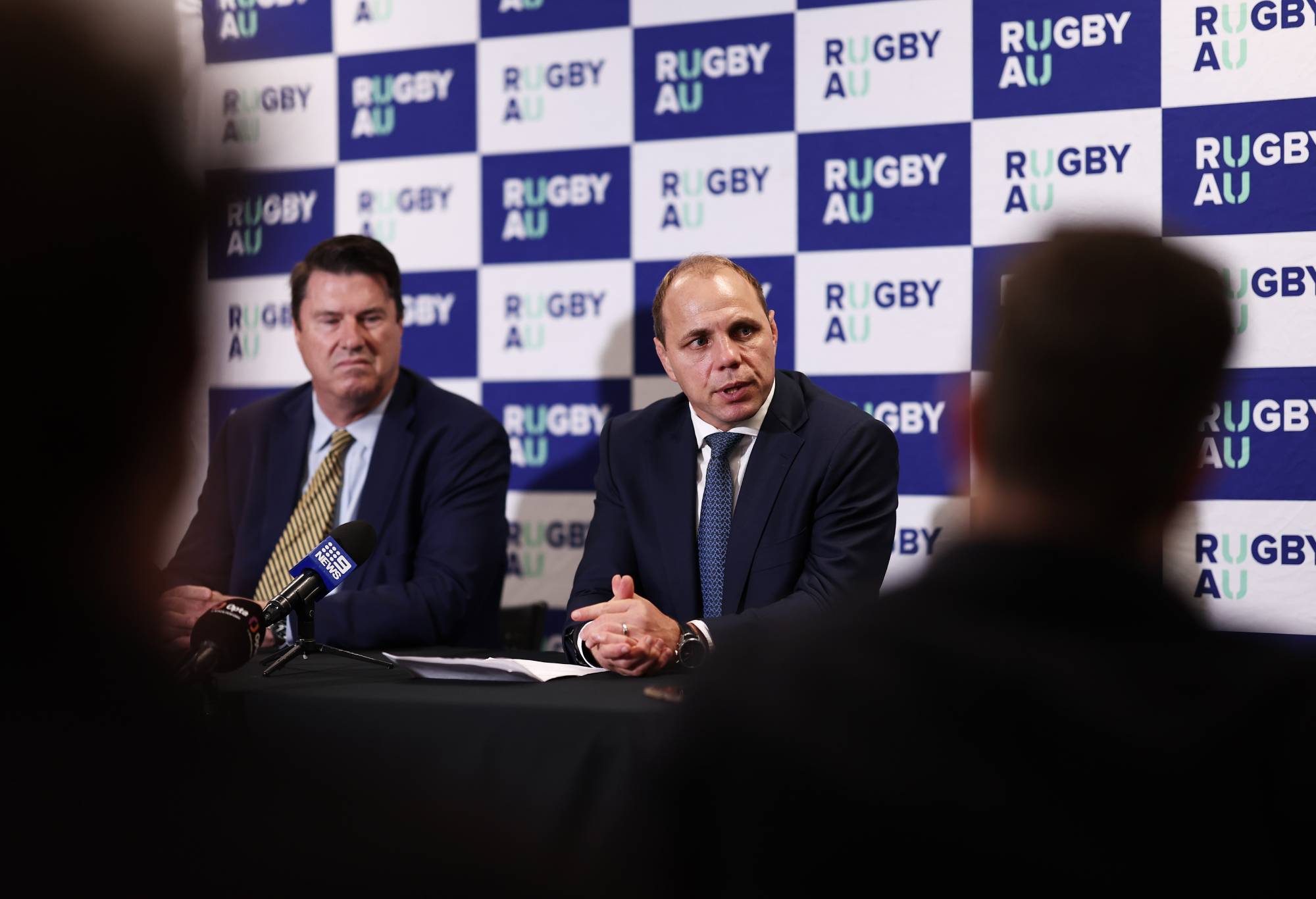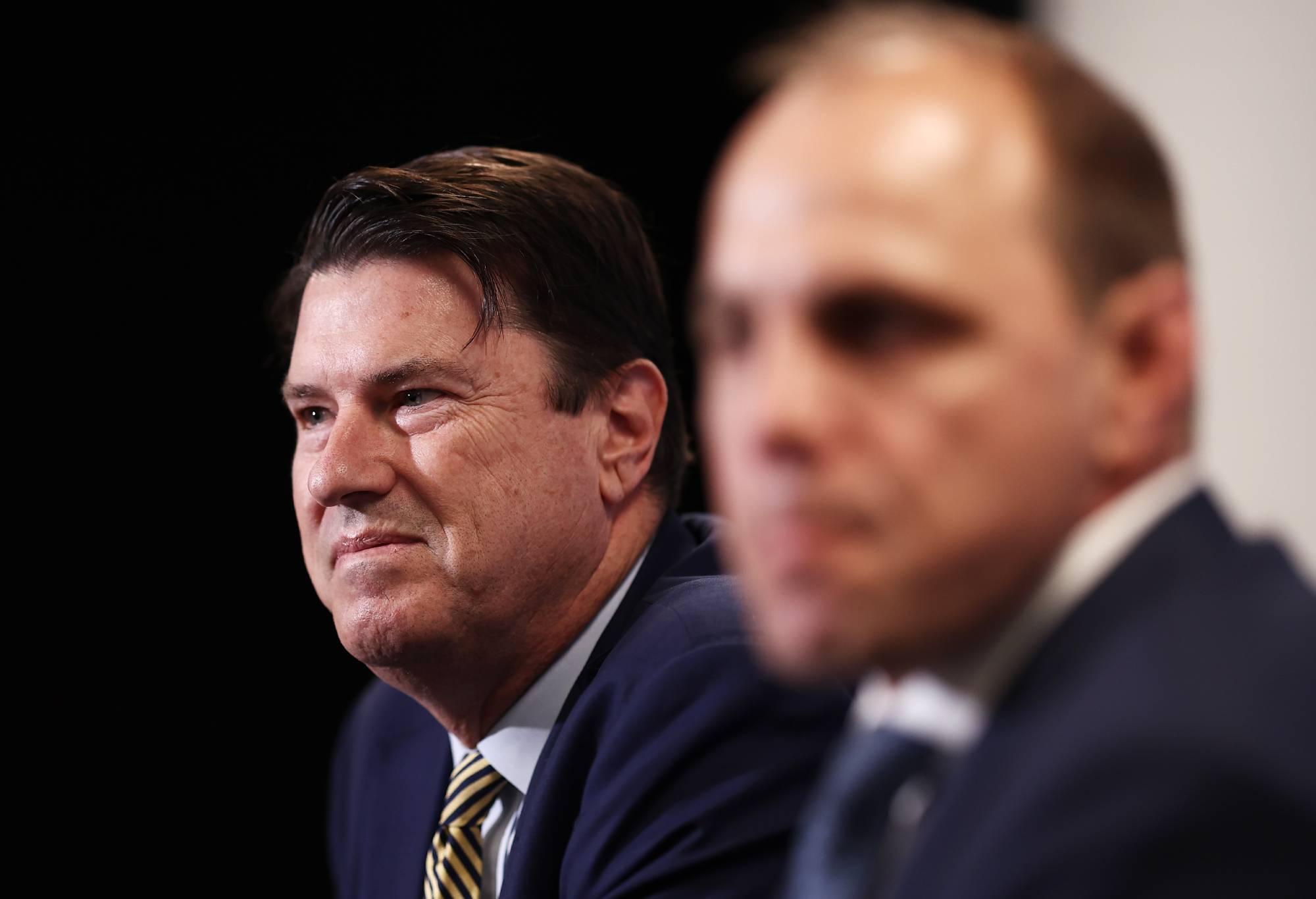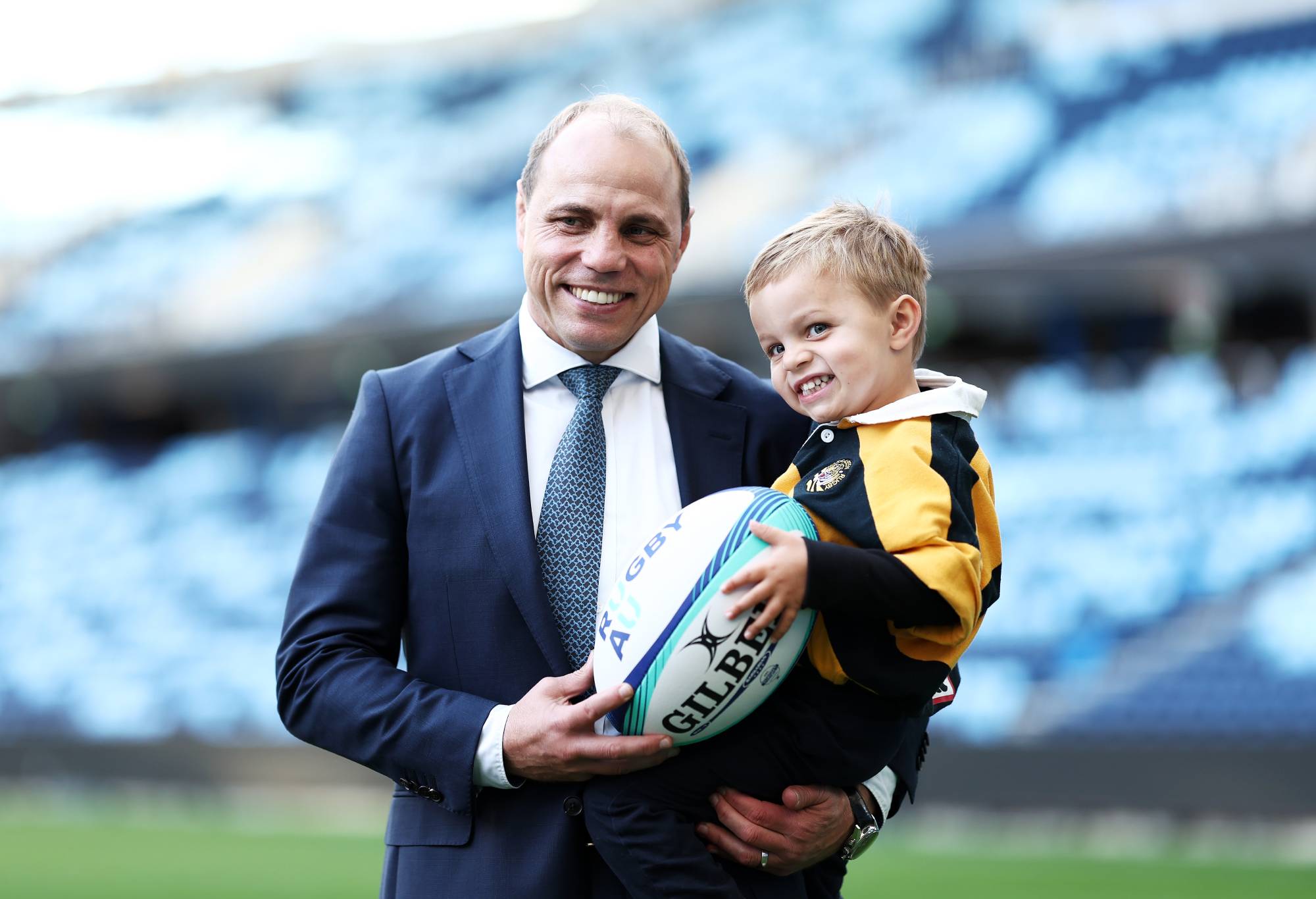Phil Waugh says he will take the same competitive edge he had as a player into his new role as Rugby Australia CEO, saying the board he leads must perform to help Australia back to the top.
The former Wallaby, who played at two World Cups and retired as the Waratahs’ most-capped captain before moving into the banking sector, outlined his vision for Australian rugby on Tuesday, saying the gap between the amateur and professional elements of the game must be urgently addressed.
The 43-year-old also said Rugby Australia and its neighbours, particularly New Zealand, had to be creative to help re-establish Super Rugby as best provincial competition in the world and ensure it was entertaining and drove people back through the turnstiles.

Newly appointed Rugby Australia CEO Phil Waugh says repairing the relationship between the amateur and professional elements is essential for the game to succeed. (Photo by Matt King/Getty Images for Rugby Australia)
Nor did Waugh dismiss the possibility of asking his counterpart Mark Robinson to reconsider their position on a Super Rugby draft.
Waugh also indicated that he was open to expanding the Wallabies’ eligibility policy for this year’s World Cup, noting that no nation has won the Webb Ellis Cup without an experienced halves combination.
Sat under the stands at Allianz Stadium, near where Waugh served as a ball boy during the Wallabies’ first Test at the Sydney Football Stadium against the Lions in 1989, Rugby Australia chairman Hamish McLennan confirmed “probably Australia’s worst kept secret” by announcing the former Wallabies flanker as Andy Marinos’ successor as chief executive.
While some have accused the appointment as another “job for the boys”, McLennan said Waugh was the standout candidate and had the high-performance and business acumen as well as the personal experience to succeed in the role.
“He delivered a stand-up presentation and his vision for the future really excited the board and our stakeholders and he won it fair and square,” McLennan said.
“You can’t put it down to one thing, but I think he’s got really high standards in terms of how he wants our on-field and off-field behaviour to coexist, and we’ve got to shoot for the stars.
“He is very performance driven and we’ve seen that in his business career.
“The board and I took a lot of comfort from the fact that he’s been there doing the hard yards over the last two-and-a-half-years. When I look at my interactions with Phil, we’ve had the healthy debates and disagreements on a range of issues, but we’ve always ended up in a better place and I think the board recognises that too.”

Rugby Australia Chairman Hamish McLennan speaks to the media as Phil Waugh is announced as the new Rugby Australia CEO at Allianz Stadium. (Photo by Matt King/Getty Images for Rugby Australia)
Although Waugh has been appointed chief executive, McLennan has been RA’s main shot-caller since being appointed to the role amid a financial, high-performance and cultural disaster in mid-2020.
RA has since climbed out of its financial hole, but despite posting a $8.2 million surplus in April – a $35.3m turnaround in three years – Marinos was pushed out after a clash of ideas and vision for the game.
Asked whether he would stand up to the hands-on McLennan, Waugh said he had no issues with “robust debate” but insisted it was about working for the greater good and presenting a united front where ideas were encouraged.
“I see it as a team effort,” he said.
“I mean you will have we always have going to have battles. It’s bit like a selection room, you’ll have some differences of opinion, but when you go out to market, you want to have a united front.
“I’ll certainly challenge aspects that I may disagree with, but then when we go to market, we need to make sure that we’re out there in front of people as a united board with the executive.
“I think it’s quite exciting. I like ambition. I like leaning in and having a crack and I certainly played my rugby that way and intend to lead the organisation the same way.”

Newly appointed Rugby Australia CEO Phil Waugh with his son Arthur Waugh at Allianz Stadium on June 06, 2023 in Sydney. (Photo by Matt King/Getty Images for Rugby Australia)
Waugh, who began playing for the Narrabeen Tigers as a four-year-old, stressed that repairing the fracture between the professional and amateur levels of the game was essential.
“I’ve got a very strong affiliation to club rugby and see the connection with the community is a massive part of my role leading the game in Australia,” he said in his opening remarks.
“We’ve seen a really big gap evolve and get widened between the professional game and the amateur game over the last decade or so. How do we bring that back together? How do we ensure that we’re all working together to beat other teams in the world rather than compete against each other? I think that’s really important.”
Waugh isn’t the first RA CEO to have made such comments.
Bill Pulver and Raelene Castle both shared similar sentiments, while Marinos also said the grassroots was one of his biggest priorities.
And yet little has changed.
Waugh said his deep-seated understanding of the pathways in the game gave him an advantage.
Waugh, who is understood to be opposed to the continual standing down of players of national interest during the Super Rugby season, said Australia’s professional players had to become more involved with their local clubs.
“It’s a pretty small population, Australia, and if you think about the rugby supporter base, it is based in the communities, it’s based in schools and clubs and we need to connect with where our base is,” he said.
“People are now making a choice about whether they go to club games or whether they go to Super Rugby games and when I was playing, you’d go to your club game and then you’d support your club players at the Super Rugby game.
“It’s really important that we actually go back to that and we put our best players and Super players into clubs. Then we bring the club supporters into Super Rugby and into Test matches. I know it sounds pretty logical, but I do think there’s been a huge separation over time.
“So how do we actually connect our rugby community and ensure that the game starts and ends in our clubs, and we need to be invested in that space.”
Waugh said he believed RA’s relationship with New Zealand was “reasonably healthy”, but admitted they needed to address their struggles on the field to help the overall standard of the competition and hinted that a redistribution of players could help.
“Our Super Rugby performance hasn’t been good enough,” Waugh said bluntly.
“I was going through with Eddie [Jones] earlier today around our statistics on our performances across Australian Super Rugby teams since 2016. When you take out the Australian versus Australian Super Rugby games, what those statistics look like and they’re considerably lower. We need to lift the performance across our Super Rugby clubs more broadly. We know when we do that, that then feeds through to better Wallaby performances.
“It’s certainly a reset across Super Rugby clubs, but also working closely with Mark Robinson, my counterpart in New Zealand, to make sure that we’ve got the right distribution of players across the teams.”

Phil Waugh and the Wallabies celebrate victory during the Rugby World Cup semi-final in 2003. (Photo by Adam Pretty/Getty Images)
Probed on whether that indicated his support of a draft, Waugh said it should be considered.
“I think we need to be pretty creative,” he said.
“I think we need that tournament to be the best provincial tournament in the world. We produce such good talent in Australia and New Zealand.
“A lot of people talk about changing laws, and I think you can be pretty creative around some of the law changes, but what people really want to see is better execution of the current laws and I think that’s where spectators do get a little bit frustrated.
“I think we’re only in the infancy of talking through that [a draft]. When I have deeper conversations with Mark Robinson, I’m not saying that’s a solution, I’m just saying that we need to get quite creative around how we think about Super Rugby.”
Meanwhile, Waugh also said RA couldn’t waste its second chance over the “golden decade” to come and said powering the women’s game was essential.
“You think about the evolution of the women’s game and what’s happening across the women’s sport as well,” Waugh continued, “the sevens probably started in 2016 with the performance of the gold medallists in Rio, but if you think about (the) full stadium at Eden Park for the Women’s World Cup last year, we’ve seen what’s happened in the Six Nations in terms of filling out Twickenham, there’s a huge opportunity across women’s sport.”
































































































